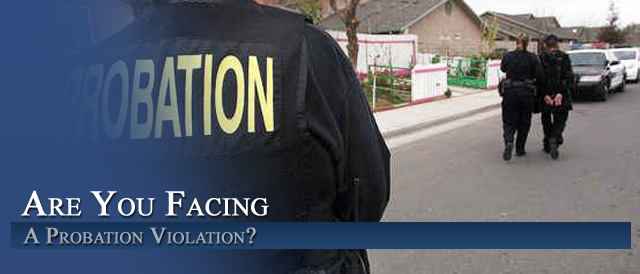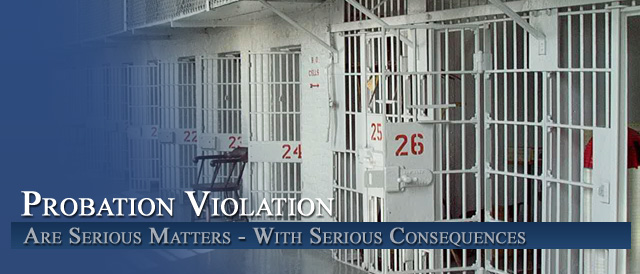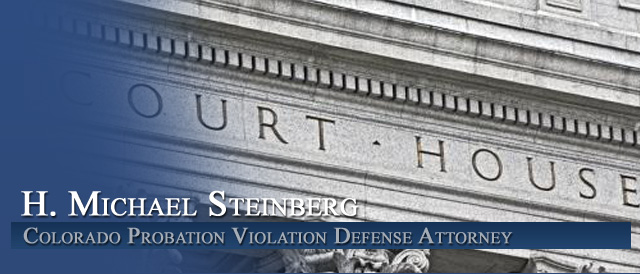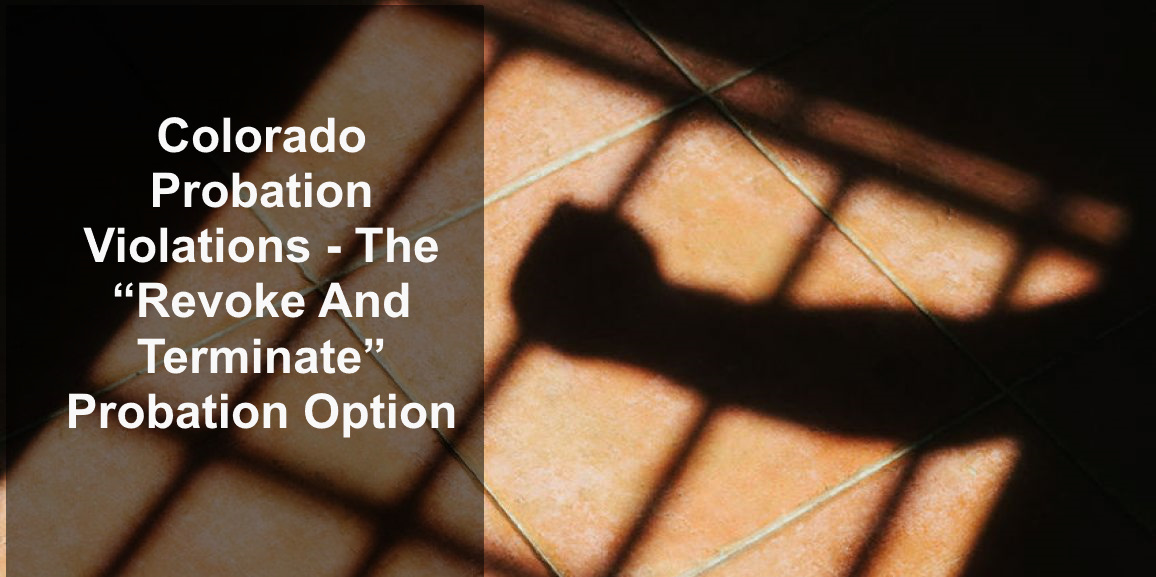




Colorado Probation Violations – The “Revoke And Terminate” Probation Option
By H. Michael Steinberg Colorado Probation Violation Criminal Defense Lawyer – Attorney
 Colorado Probation Violations – The “Revoke And Terminate” Probation Option – When faced with how to handle a Colorado probation revocation matter where you are alleged to have violated the terms and conditions of your probation – one rare but possible option is the “revoke and terminate” probation plea bargain.
Colorado Probation Violations – The “Revoke And Terminate” Probation Option – When faced with how to handle a Colorado probation revocation matter where you are alleged to have violated the terms and conditions of your probation – one rare but possible option is the “revoke and terminate” probation plea bargain.
To understand this concept, we first revisit the kind of procedures and processes that confront you when you are charged with a violation of probation. Violation of probation cases can not only present complications as regards your options – the situation is made more critical because making the wrong decision in a revocation case can result in severe consequences.
While there are many ways to violate probation. There are two basic umbrella categories
(1) “technical” violations and
A “technical violation” is essentially any violation that does not involve a new criminal charge – a new law violation. Examples include:
1. Failing to report;
2. Failing to pay court costs, fines, restitution or the costs of probation supervision;
3. Lying or misleading the PO (probation officer);
4. Not completing your community service hours;
5. Moving without permission;
6. Changing or losing employment;
7. Failure to successfully complete a counseling or treatment program;
A “substantive violation” is the alleged commission of a new crime such as a municipal violation, a misdemeanor offense or a felony charge that occurs after you are placed on probation.
What Are Your Options In A Colorado Probation Violation Case?
Your basic options in court when faced with a probation violation are:
(1) admit some or all of the violations that are alleged for the violation of your probation in the context of an agreed upon plea agreement and let the Judge decide the sentence (“open sentencing”);
(2) admit some or all of the violations and stipulate (agree with the prosecutor) to a specific sentence subject to the Judge’s approval;
(3) Litigate some or all of the alleged violations of your probation – with no plea agreement.
Option 1 – Plea Bargaining – The Colorado Probation Violation Case That Is Plea Bargained
As in all criminal cases, a plea bargain can be reached among the parties to a Colorado probation violation matter. And as in other kinds of criminal cases – you have the option to litigate the case – that is – take the matter “to hearing.” (See Option 2 – below).
Reaching A “Stipulation” Means An Agreement With The District Attorney And The PO (Probation Officer)
Obviously the very best way to handle a probation violation case is to work out some an agreed upon recommendation to take to the Judge. Known as a “stip” or stipulation – a stip permits you the most control over the result. Examples might be to continue the hearing to complete community service hours, to string together a series of clean UA’s , to finish an anger management class etc.
By continuing the case without resolution of the complaint to revoke probation, the sentencing Judge is kept out of the agreement and the matter never has to move to sentencing on the violation – at least until the next court date.
If, under this scenario, the Defendant complies with the agreed stip – the Judge will always follow the joint recommendation of the parties to either withdraw the motion to revoke probation and just continue the term of probation- or in some more extreme cases, revoke and reinstate probation under the same original terms of probation without putting the accused in jail or in prison.
A quick note, the prosecutor will only rarely withdraw a motion to revoke probation. This rare occurrence happens only in the least serious cases – such as the failure to pay court costs, or needing time to finish just a few community service hours.
Option 2 – Litigating The Colorado Probation Violation Complaint To Revoke
If you decide to “take the case to hearing” after hearing the evidence the Judge decides whether you have in fact violated your probation. After making that finding, the Judge will move the sentencing phase to determine the consequences for noncompliance.
At the Colorado probation violation hearing the DA will most likely call a probation officer to testify about the allegations in the probation violation complaint. Before a Colorado Judge can revoke your probation he or she must find that the testimony of the PO is sufficient to prove that you more likely than not violated the terms of the probation agreement.
This is a very low burden of proof. That burden is much less than the beyond a reasonable doubt standard at a Colorado criminal trial. The “preponderance of the evidence” standard means that the evidence that you violated your probation cab be proven with only 51% of the evidence establishing the alleged violations of probation.
The Possible Findings Following The Evidence Presented At The Colorado Probation Violation Hearings
There are several possible results at the conclusion of the evidentiary phase of a probation violation hearing:
1. A Colorado Judge can find that you have violated some or all of the terms of probation and remand you to custody pending the sentencing hearing.
2. The Colorado Judge can find that you did not violate the terms of your probation and continue your probation period under the original terms and conditions.
3. The Colorado Judge can find that you violated the terms of probation, revoke your probation, and then reinstate your probation giving you more time to finish the original conditions and – or the Judge may add some additional conditions as a punitive measure which can include a short jail sentence.
4. The Colorado Judge can find that you violated the terms of your probation revoke your probation, sentence you to a jail or prison and then terminate the probation term. .
An Unusual, But Sometimes Desirable Result, The “Revoke and Terminate” (Unsatisfactory Termination of Probation) Option
In very rare cases the DA and the Judge may agree to something call the “revoke and terminate” option. This is typically a complete termination (end) of your probation.
This stipulation can be negotiated when the parties agree that probation is no longer in the interests of justice. To be terminated “unsatisfactorily” or “unsuccessfully” means that it makes no sense to continue on probation. But, also like a “dishonorable discharge” from the military – this failure at probation is reflected on your permanent criminal history.
Examples of “revoke and terminate” scenarios might include:
1. Probationers who owe restitution as a condition of probation, have tried to pay it but it is clear to everyone involved that even with “good-faith” efforts the probationer will never have the ability to pay during the period of probation. Where there are no public safety concerns, the “stip” may be to roll the remaining restitution into a civil judgement and terminate the criminal case.
2. Probationers who become very ill and their alleged probation violations are technical in nature.
3. Probationers Offenders who abscond from probation supervision and return years later as very different people.
4. A probationer who has been sentenced to prison in a very serious case where the at issue sentence is only a misdemeanor and there is no victim and there is no restitution owing.
5. Individuals who have been deported. Once deportation has been confirmed – probation is then terminated unsuccessfully.
6. Probationers who have served a substantial period of time in custody on a probation violation and the case at issue is only minor in nature. These agreements are called “time served” stipulations as probation is terminated because of the “time served” awaiting resolution of the case.
“Global” Plea Agreements Where A New Criminal Case is The Basis For The Violation Of Probation – A Simple Example
Perhaps the most serious kind of Colorado probation violation is when the violation is based on an alleged commission of a new crime. When this occurs it is often a good idea to negotiate both the probation violation and the new criminal case at the same time. This is called a “global disposition.”
The sequence is usually along this time line. A Defendant is placed on probation for a relatively minor misdemeanor. After a few months the Defendant is arrested for a new – and serious – felony charge. The evidence in the new case is too strong to take the case to trial and a plea bargain makes sense.
The goal of the experienced criminal defense lawyer is to make certain that the client in this situation does not receive “double punishment” – but rather the lawyer negotiates (sometimes in two or more different jurisdictions) for a global “deal” that results in the client receiving the best possible result in both cases.
The Colorado Statute That Governs Colorado Probation Violation Cases
§ 16-11-206. [Colorado Rules For Probation] Revocation Hearing(s)
(1) At the first appearance of the probationer in court or at the commencement of the hearing, whichever is first in time, the court shall advise the probationer as provided in section 16-7-207 insofar as such matters are applicable; except that there is no right to a trial by jury in proceedings for revocation of probation.
(2) At or prior to the commencement of the hearing, the court shall advise the probationer of the charges against him and the possible penalties therefor and shall require the probationer to plead guilty or not guilty.
(3) At the hearing, the prosecution has the burden of establishing by a preponderance of the evidence the violation of a condition of probation; except that the commission of a criminal offense must be established beyond a reasonable doubt unless the probationer has been convicted thereof in a criminal proceeding. When, in a revocation hearing, the alleged violation of a condition is the probationer’s failure to pay court-ordered compensation to appointed counsel, probation fees, court costs, restitution, or reparations, evidence of the failure to pay shall constitute prima facie evidence of a violation.
The court may, when it appears that the alleged violation of conditions of probation consists of an offense with which the probationer is charged in a criminal proceeding then pending, continue the probation revocation hearing until the termination of the criminal proceeding. Any evidence having probative value shall be received regardless of its admissibility under the exclusionary rules of evidence if the defendant is accorded a fair opportunity to rebut hearsay evidence.
(4) If the probationer is in custody, the hearing shall be held within fourteen days after the filing of the complaint, unless delay or continuance is granted by the court at the instance or request of the probationer or for other good cause found by the court justifying further delay.
(5) If the court determines that a violation of a condition of probation has been committed, it shall, within seven days after the said hearing, either revoke or continue the probation. If probation is revoked, the court may then impose any sentence or grant any probation pursuant to the provisions of this part 2 which might originally have been imposed or granted.
Colorado Probation Violations – The “Revoke And Terminate” Probation Option
If you found any of the information I have provided on this web page article helpful please click my Plus+1 or the Share buttons for Twitter and Facebook below so that others may also find it.
The reader is admonished that Colorado criminal law, like criminal law in every state and at the Federal level, changes constantly. The article appearing above was accurate at the time it was drafted but it cannot account for changes occurring after it was uploaded.
If, after reading this article, you have questions about your case and would like to consider retaining our law firm, we invite you to contact us at the Steinberg Colorado Criminal Defense Law Firm – 303-627-7777.
Never stop fighting – never stop believing in yourself and your right to due process of law. You will not be alone in court, H. Michael will be at your side every step of the way – advocating for justice and the best possible result in your case. H. Michael Steinberg is passionate about criminal defense. His extensive knowledge and experience of Colorado Criminal Law gives him the edge you need to properly handle your case
 ABOUT THE AUTHOR: H. Michael Steinberg – Email The Author at:
ABOUT THE AUTHOR: H. Michael Steinberg – Email The Author at:
A Denver Colorado Criminal Defense Lawyer – or call his office at 303-627-7777 during business hours – or call his cell if you cannot wait and need his immediate assistance – please call 720-220-2277.
“A good criminal defense lawyer is someone who devotes themselves to their client’s case from beginning to end, always realizing that this case is the most important thing in that client’s life.”
You should be careful to make a responsible choice in selecting a Colorado Criminal Defense Lawyer. We encourage you to “vet” our firm. Over the last 40 plus years – by focusing ONLY on Colorado criminal law – H. Michael has had the necessary time to commit to the task of constantly updating himself on nearly every area of criminal law, to include Colorado criminal law and procedure and trial and courtroom practice.
Putting more than 40 years of Colorado criminal defense experience to work for you.
H. Michael works hard to get his clients the best possible results in and out of the courtroom. He has written, and continues to write, extensively on Colorado criminal law and he hopes this article helps you in some small way – Colorado Probation Violations – The “Revoke And Terminate” Probation.

Other Articles of Interest:
- Denver Colorado Probation Early Termination Issues – Why Terminate Probation Early?
- Colorado Technical Probation Violation Cases
- Successfully Defending A Colorado Probation Violation Charge
- Colorado Probation Law – Restitution Order May Lead To A Life Sentence On Probation.
- In Colorado What Exactly IS Unsupervised Probation?












